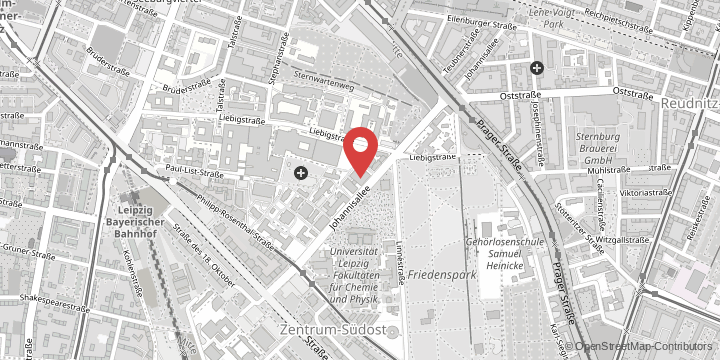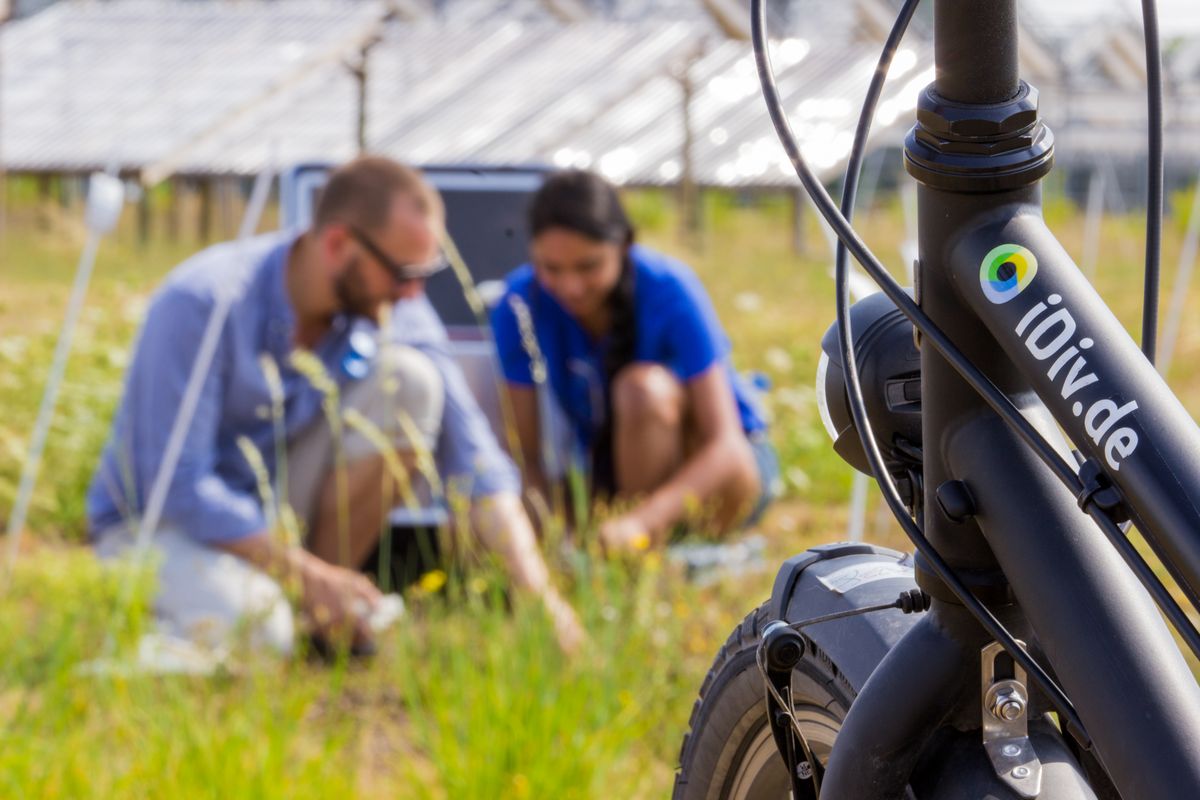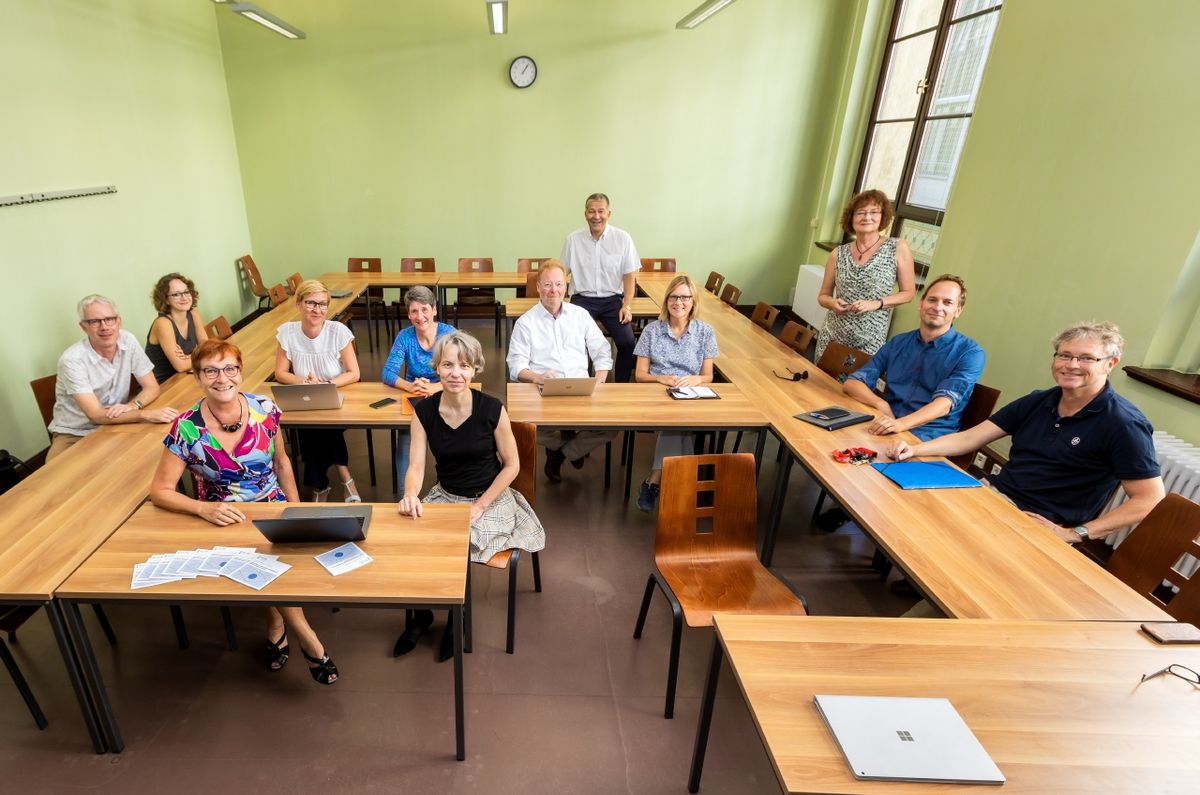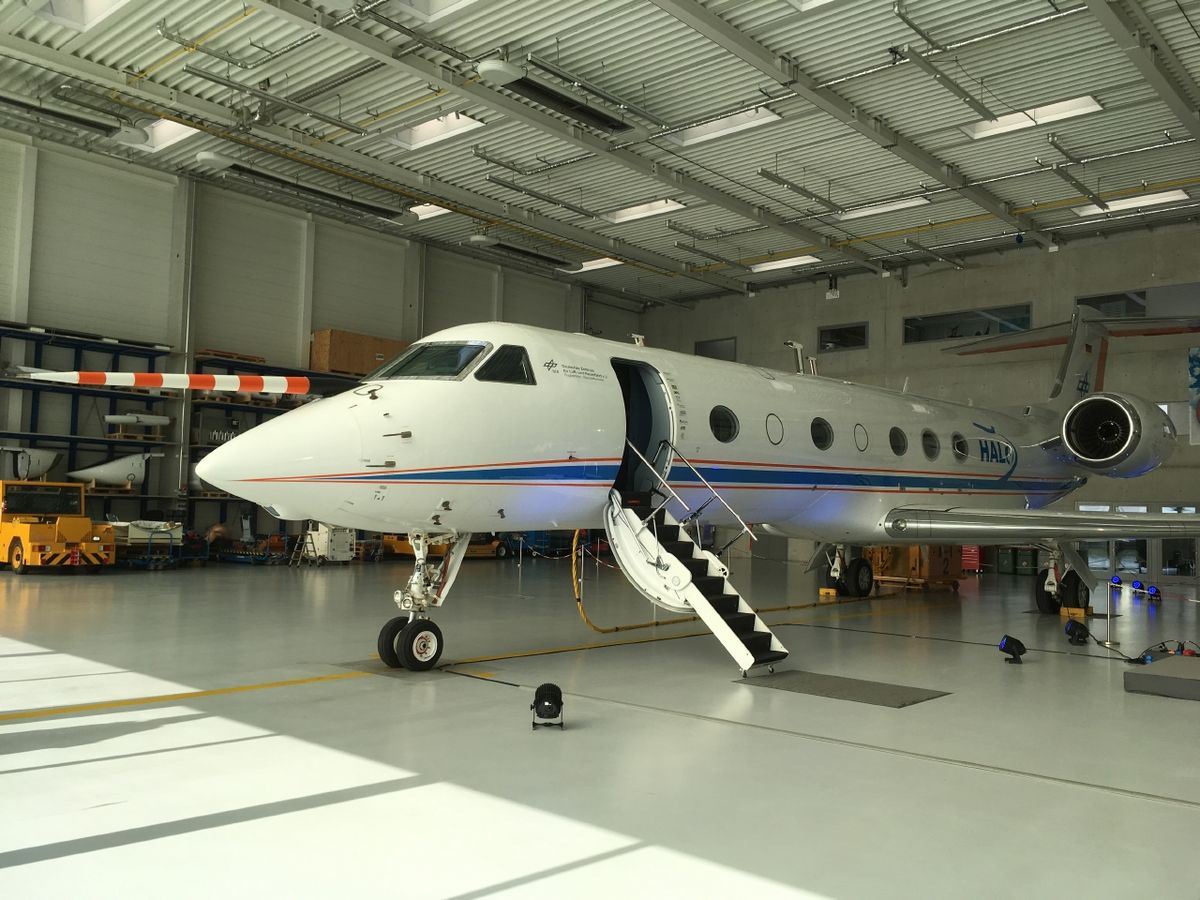The German Research Foundation (DFG) is the self-governing organisation for science and research in Germany and at the same time the country’s largest funding institution for basic research. It is responsible for awarding the funding provided by the federal government and the Länder to outstanding researchers and promising research projects.
Leipzig University is currently involved in 17 DFG-funded coordinated programmes. It is also involved in sub-projects as partner. In increasingly interdisciplinary collaborative projects, such as the German Centre for Integrative Biodiversity Research (iDiv) and the Obesity Mechanisms Collaborative Research Centre, the University is demonstrating its versatile research expertise. Researchers are also co-applicants and participants in 14 funded consortia of the National Research Data Infrstructure. In addition, there are currently eleven early career research groups funded by the DFG under the Heisenberg Programme and the Emmy Noether Programme.
1. Research Centres
The DFG Research Centres are some of the German Research Foundation’s most comprehensive and exclusive collaborative projects. Unlike other projects and programmes, DFG Research Centres are set up in response to thematic calls issued by the DFG. The aim is to hone the fundamental orientation of the research profile of the universities that receive funding and to draw international attention to the relevant research foci. At present, the DFG is only funding four such Research Centres nationwide, providing a total of 25 million euros a year.
The German Centre for Integrative Biodiversity Research (iDiv) Halle-Jena-Leipzig is a DFG Research Centre and a joint institution of Leipzig University, the Martin Luther University Halle-Wittenberg (MLU) and the Friedrich Schiller University Jena (FSU). It is run in collaboration with the Helmholtz Centre for Environmental Research (UFZ).
Cataloguing Biological Diversity: A Herculean Task?
We know that we are dramatically changing the planet’s biological diversity: species are becoming extinct, and genetic information and entire ecosystems being wiped out. At iDiv, researchers from 30 nations are working on understanding the extent of these changes, the underlying processes and the consequences for the human race. The clock is ticking – or, as Leipzig professor and head of iDiv Christian Wirth puts it:
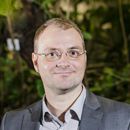
“The central problem in understanding and measuring biological diversity is that we still have a lot of work to do. And while we are taking inventory, the shelves are already being cleared.”
Professor Christian Wirth
2. Collaborative Research Centres and Transregios
Collaborative Research Centres (CRCs) and Transregios are made up of a number of sub-projects. They involve several different departments from universities and research institutions across the region working together. Running for a maximum of twelve years, they allow the participating researchers to devise and carry out challenging and complex research projects. Transregios differ from Collaborative Research Centres in that usually two or three universities submit a joint proposal and up to a third of the research is undertaken by non-university research institutions.
DFG Collaborative Research Centres and Transregios Hosted by Leipzig University:
The Obesity Mechanisms Collaborative Research Centre has been examining three main research foci since 2013: overeating, fat deposition and inflammation, and altered adipokine secretion. In cooperation with three partner institutions – the Max Planck Institute for Human Cognitive and Brain Sciences, the Helmholtz Centre for Environmental Research (UFZ) and Ben-Gurion University of the Negev (Israel) – the researchers aim to enhance our understanding of obesity as a multifactorial and socially relevant disease. Graduates of the Obesity Mechanisms Integrated Research Training Group can acquire the knowledge gained in obesity research as well as additional practical skills, thus equipping them for successful scientific careers.
The competence center for “Understanding Obesity” bundles interdisciplinary research on this modern disease at the University of Leipzig in order to develop solid concepts for dealing with the social challenge of obesity.
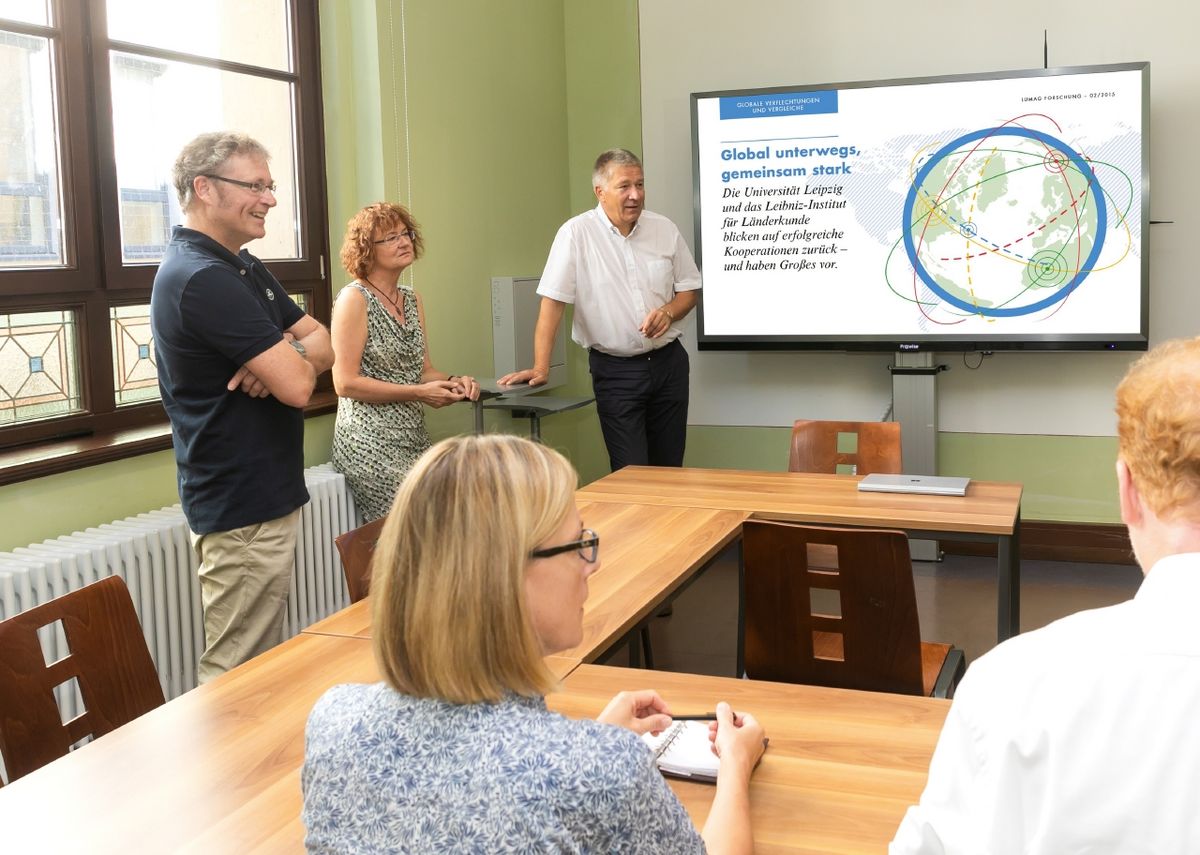
Firstly, the Spatialization under the Global Condition Collaborative Research Centre investigates the emergence of spatial formats – the results of spatial action of individual stakeholder groups, such as territories, networks, chains, enclaves, corridors and (special) zones. Secondly, this Collaborative Research Centre aims to understand how these spatial formats are combined into complex spatial orders, and their evolution since the 18th century under the global condition. The collaborative project is also part of the interdisciplinary research programme of the Leipzig Research Centre Global Dynamics (ReCentGlobe) and includes an integrated Research Training Group, which acts as a link between academic education and interdisciplinary research.
Cells communicate with each other and their environment via receptors. G protein-coupled receptors (GPCRs) are the largest group of membrane receptors and found in almost all living organisms. In CRC 1423, “Structural Dynamics of GPCR Activation and Signal Transduction”, Leipzig University researchers from the life sciences, medicine, pharmacy and bioinformatics are investigating interactions between peptide receptors and adhesion receptors – GPCRs that have so far been the subject of little research. To this end, they are collaborating with partners at the Charité university hospital in Berlin, the Helmholtz Association’s Max Delbrück Center for Molecular Medicine, and the Martin Luther University Halle-Wittenberg. One of the CRC’s goals is to clarify the dynamic structural states of these GPCRs in order to understand their functions. This could lead to the development of novel therapeutics for this class of GPCRs. Doctoral candidates at this CRC are trained in its integrated Research Training Group.

With the CRC/Transregio 172, we are conducting systematic large-scale research in the field of Arctic climate amplification (AC)³ for the first time in Germany. Applying a variety of different methods, the aim of the wide-ranging research alliance with the University of Bremen, the University of Cologne, the Alfred Wegener Institute and the Leibniz Institute for Tropospheric Research is to observe climatic changes in the Arctic over long periods of time. On the basis of observations of measuring instruments on satellites, aircraft, airborne balloon platforms, research vessels and the results of selected ground-based monitoring stations, the researchers are developing models to reliably predict the warming already recorded in the Arctic.
The Transregio 386 HYP*MOL aims to merge the fields of magnetic resonance, spintronics, and spin chemistry. Scientists from the University of Leipzig and the Chemnitz University of Technology, along with other partners, collaborate to investigate the phenomenon of hyperpolarization, the controlled generation of short-lived spin order of electrons or magnetic nuclei. They contribute to the fundamental understanding of the generation of electron and nuclear spin hyperpolarization, their transport through molecular structures, and their control. Professor Jörg Matysik from the Institute of Analytical Chemistry at the University of Leipzig leads the research consortium together with co-speaker Professor Georgeta Salvan from the Institute of Physics at Chemnitz University of Technology.
DFG Collaborative Research Centres and Transregios (Leipzig University as Project Partner):
Chemical mediators play a key role in many habitats of species communities. Coordinated by the University of Jena, Collaborative Research Centre 1127 investigates fundamental control mechanisms in complex biosystems in order to elucidate the effects and effective sites of mediators, with the long-term aim of being able to manipulate complex biosystems.
Dr Severin Sasso from Leipzig University’s Institute of Biology is co-head of a sub-project focusing on identifying secondary metabolites with roles in interaction between Chlamydomonas reinhardtii and other microorganisms.
The Collaborative Research Center 1320 "Science of Everyday Activities - Analytical and Generative Modeling" (EASE), coordinated by Professor Michael Beetz from the University of Bremen, explores a new approach in basic research on the principles of human information processing. The goal is to develop information-processing models that enable autonomous robots to master everyday activities fully.
Professor Carsten Lutz from the Institute of Computer Science is conducting research within the project on ontologies with abstraction.
Collaborative Research Centre 1140, Hybrid Societies: People Interacting with Embodied Digital Technologies, is coordinated by Chemnitz University of Technology. Its interdisciplinary team are researching the conditions for humans and machines to successfully live side by side in public space.
Professor Christian Pentzold from the Institute of Communication and Media Studies leads the sub-project concerned with public relations on the topic of knowing, understanding, and engaging with embodied technologies. The project addresses core segments of our changing society. It offers communicative interfaces to three main target groups: the general public, political stakeholders and industry representatives.
In Collaborative Research Centre 1083, Structure and Dynamics of Internal Interfaces, chemists are collaborating with physicists to investigate solids and solid-state interfaces of a variety of organic and inorganic materials in order to achieve a detailed microscopic understanding of chemical bonding, electronic coupling and energy transfer dynamics for model systems of different classes of heterointerfaces.
Professor Ralf Tonner of the Institute of Theoretical Chemistry is working on the sub-project “Unified density functional description of bonding and interaction at inorganic/organic interfaces”.
As the European population ages rapidly, the social and socio-economic relevance of regenerative therapies is steadily increasing. The research project ELAINE, which is led by the University of Rostock, concentrates on novel, electrically active implants for use in the regeneration of bone and cartilage.
Professor Angelika Richter from Leipzig University’s Institute of Pharmacology, Pharmacy and Toxicology is co-head of a sub-project focusing on deep brain simulation in models of dystonia.
Collaborative Research Centre / Transregio 325, Assembly-Controlled Photocatalysis, aims to develop a new generation of photocatalytic systems for organic synthesis by controlling the interactions between the catalyst and the reaction partners. In the long term, it wants to contribute to the further saving of energy and resources in light-driven reactions. Professor Thorsten Bach from the Technical University of Munich is the spokesperson of this Transregio.
The professors Tanja Gulder and Kirsten Zeitler from the Institute of Organic Chemistry at Leipzig University are each involved with a sub-project.
The Transregio 294 "Transformation of Property," coordinated by Professor Hartmut Rosa from the Friedrich Schiller University Jena, conducts interdisciplinary research to regain the sociological perspective on property and empirically examine the assumed structural transformation.
Dr. Lars Vogel from the Institute of Political Science conducts research on economic property and political (in)equality as an elite sociological analysis within this project.
In Transregio/CRC 296, Local Control of TH Action, researchers are addressing the question of which components control organ homeostasis and to what extent a change influences diseases. The interdisciplinary consortium with a spokesperson at the University of Duisburg-Essen has a unique collection of mouse models for all key components, as well as disease-specific models and patient cohorts. Innovative technologies for targeted modulation of local thyroid hormone tissue status are used.
At the Institute of Anatomy, Professor Ingo Bechmann is investigating monocarboxylate transporter 8, a specific transporter for thyroid hormones in the brain, in sub-project P03, Transporter Expression and TH Action in the Brain.
Transient receptor potential (TRP) channels form a complex protein family with many important functions as cellular sensors and effectors. TRP proteins thus regulate an extraordinarily broad range of physiological homeostatic functions. CRC/Transregio 152, Maintenance of Body Homeostasis by Transient Receptor Potential Channel Modules, is working on reclassifying and redefining the known TRP channels. This is leading to new approaches and tailored therapies for patients with diseases associated with dysfunctional TRP proteins.
Professor Michael Schäfer from Leipzig University’s Rudolf Boehm Institute of Pharmacology and Toxicology is supporting the lead institution, Ludwig-Maximilians-Universität München, in a sub-project investigating the influence of drug-like compounds on diseases involving TRP channels.
The Transregio 360 "Restricted Quantum Matter," led by Professor István Kézsmárki from the University of Augsburg, aims to advance the fundamental understanding of quantum matter and enable the use of constraints to generate novel quantum states.
Professor Alexander Tsirlin from the Felix Bloch Institute for Solid State Physics conducts research within the subproject "Dynamics of rare-earth-based frustrated magnets" in this endeavor.
3. Research Training Groups
Research Training Group (RTGs) are thematic research programmes that serve the structured qualification of junior researchers. By integrating courses, the focus is on providing participants with further training. They prepare doctoral candidates for their everyday academic work and help them become independent.
Research Training Group Hosted by Leipzig University:
The RTG 2939 “Economics of Connected Natural Commons: Atmosphere and Biodiversity - Eco-N” develops an integrative perspective on the sustainable use of natural commons in the area of the atmosphere - namely aerosols, regional climate and urban air - and biodiversity - namely forests and soils. Martin Quaas, Faculty of Economics and German Center for Integrative Biodiversity Research (iDiv), is the spokesperson for the RTG, which will begin its research work in fall 2024.
The IRTG 2899 “Belongings: Jewish Material Culture in Twentieth-Century Europe and Beyond” is an international research training group in cooperation with the Hebrew University in Israel and the Leibniz Institute for Jewish History and Cultures - Simon-Dubnow that investigates Jewish objects, materials, history and culture in an interdisciplinary research approach. The IRTG, with Professor Yfaat Weiss, Faculty of History, Arts and Area Studies and Director of the DI, as spokesperson and Professor Benjamin Pollock, Hebrew University, as co-spokesperson, will begin its research work in fall 2024.
Hydrogen Isotopes 1,2,3H
In Research Training Group 2721, Hydrogen Isotopes 1,2,3H, chemists and physicists from different disciplines conduct research in three overlapping research areas on (A) chemical bonds, (B) membranes and diffusion, and (C) labelling and detection of hydrogen isotopes. The goals of the 15 research projects are to understand nuclear quantum effects, to synthesise new materials for the separation of hydrogen isotopes, and to develop methods for late-stage hydrogen isotope exchange. The spokesperson of the Research Training Group is Professor Knut Asmis from the Wilhelm Ostwald Institute of Physical and Theoretical Chemistry.
Research Training Groups (Leipzig University as Applicant):
The International Research Training Group “TreeDi – Tree Diversity Interactions: The Role of Tree-Tree Interactions in Local Neighbourhoods in Chinese Subtropical Forests” led by the German Centre for Integrative Biodiversity Research (iDiv) Halle-Jena-Leipzig together with the University of Chinese Academy of Sciences (UCAS) in China is investigating how tree-tree interactions in local neighbourhoods translate into the observed positive tree species richness effects on key ecosystem functions at the community level. The international qualification programme provides for intensive Chinese-German cultural exchange during a six-month research stay in the partner country. There is also a joint doctoral candidate advisory committee with Chinese and German project leaders and close cooperation with leading figures of biodiversity research.
The aim of Research Training Group 2522, “Strong Dynamics and Criticality in Quantum and Gravitational Systems”, is to investigate and calculate the emergence of complexity in gravitational and quantum field theories based on basic building blocks. The teams focus on examples of topicality or conceptual relevance, such as gravitational wave phenomena and black holes on the gravitational side and dynamics and criticality of near phase transitions on the quantum side. The Research Training Group is conducted in collaboration with the Friedrich Schiller University Jena.
Research Training Group (Leipzig University as Project Partner):
The Graduate School 2767 "Supramolecular Structures: From Materials to Optical and Electronic Components" at the Dresden University of Technology, led by Professor Andreas Fery, connects the research areas of applied physics and device development. All doctoral projects are located at the interface between materials and components and address generic challenges that enable the transition from materials to components.
Professor Ralf Seidel from the Peter Debye Institute for Soft Matter Physics is one of the project leaders of the graduate school in the field of physics.
Integrated Research Training Groups in Collaborative Research Centres and Research Centres:
The Obesity Mechanisms Integrated Research Training Group is part of the Collaborative Research Centre of the same name, CRC 1052.
Collaborative Research Centre 1199, Processes of Spatialization Under the Global Condition, offers an Integrated Research Training Group.
The Graduate School yDiv is part of the German Centre for Integrative Biodiversity Research (iDiv).
The Integrated Research Training Group is part of Collaborative Research Centre 1423, Structural Dynamics of GPCR Activation and Signaling. Its training programme covers all aspects of current GPCR research. A comprehensive qualification programme is being established, comprising four sections: scientific modules, annual summer schools, international laboratory rotations, and professional skills workshops. This profile qualifies graduates for independent careers in a variety of academic and industrial fields.
The integrated graduate program is part of Transregio 386 "HYP*MOL - Hyperpolarization in Molecular Systems." The training program will provide PhD students and postdoctoral researchers of the TRR with a solid scientific background in the core areas of the collaborative project: hyperpolarized methods of magnetic resonance, molecular spintronics, and spin chemistry. The research brings together young researchers from these three fields and, for the first time, trains a generation of spin scientists who are proficient in all three areas. The training program includes specialized scientific modules on the current state of hyperpolarization research, joint summer schools, international lab rotations, and workshops for professional qualification at UL and TU Chemnitz.
4. Research Units
The DFG-funded Research Units are teams of researchers working together on a research project, offering a high degree of flexibility in the composition of programme modules and the selection of research institutions. This lets the Research Units intensify symbiotic collaboration with non-university institutions and international partners. Funding is usually provided for eight years. Centres for Advanced Studies are a special funding format in the humanities and social sciences. In addition to supporting the activities of the participating researchers, there is also a fellow programme for guests from Germany and abroad, who are invited for periods of up to two years.
Research Units Hosted by Leipzig University:
The Humanities Centre for Advanced Studies “Multiple Secularities – Beyond the West, Beyond Modernities” examines different arrangements of secularity, or the distinction between religious and other social spheres in cultures outside the Western modern world. In this way, the researchers aim to both shed light on the mechanisms of this differentiation and understand the associated conflicts surrounding the power of interpretation and claims to validity in different world regions. In the first funding period, the researchers will concentrate on regions of the Islamic world and the wider Asian region.
Copper iodide is a unique p-conductive, wide-gap semiconductor, uniting high transparency in the visible spectral range with unsurpassed hole conductivity. In its first funding period, the “Copper Iodide as Multifunctional Semiconductor” Research Unit will tackle fundamental chemical and physical problems from an experimental and theoretical perspective. In the second funding period, the focus of the Research Unit will shift to practical issues, such as device applications and integration of devices, making use of the multifunctional properties of copper iodide as a contact material, in integrate circuits, for thermoelectric powering of such circuits, and in temperature sensors.
The central aim of Research Unit 5000 – Biotic Interactions, Community Assembly, and Eco-Evolutionary Dynamics as Drivers of Long-Term Biodiversity–Ecosystem Functioning Relationships – is to find out which mechanisms influence biodiversity–ecosystem functioning in the short and long term. To this end, it applies new experimental and analytical methods in one of the world’s longest-running biodiversity experiments: the Jena Experiment. Professor Nico Eisenhauer from the German Centre for Integrative Biodiversity Research (iDiv) Halle-Jena-Leipzig leitet die Forschungsgruppe, in der Wissenschaftlerinnen und Wissenschaftler aus den Bereichen Ökologie, Biochemie und Mikrobiologie interdisziplinär zusammenarbeiten.
Cyclic structure building and optimization are two central research areas of grammatical theory, but only a fraction of the research on these mechanisms involves their interaction. Led by Professor Jochen Trommer, the researchers from the Institute of Linguistics are investigating the empirical scope of models combining cyclicity and optimization, and hope to extend this to a comprehensive, representative subdomain of grammatical phenomena and unlock the full theoretical potential of these approaches. This Research Unit’s individual sub-projects are investigating interactions between all grammatical modules (morphology, syntax, semantics and phonology) and systematically comparing different cyclic optimization approaches for the same or closely related types of empirical data. An additional sub-project in the field of computer linguistics is examining abstract, formal properties of cyclic optimization approaches beyond the boundaries of grammatical sub-domains.
5. Priority Programmes Coordinated by Leipzig University
As a rule, a Priority Programme (SPP) receives funding for a period of six years. Researchers submit corresponding applications for research grants in a specific subject area for which an invitation to tender has been issued. A particular feature of the Priority Programme is the nationwide collaboration between its participating researchers.
The Infrastructure Priority Programme 1294, Atmospheric and Earth System Research with the “High Altitude and Long Range Research Aircraft” (HALO), has received DFG funding since 2017. One of the project coordinators is Professor Manfred Wendisch of Leipzig University’s Institute for Meteorology. The HALO research aircraft is used to study atmospheric and geophysical processes. The focus is on answering questions of climate and environmental science.
Priority Programme 2361, On the Way to the Fluvial Anthroposphere, explores the interactions between human societies and pre-industrial floodplains in Central Europe. The core research question of this Priority Programme is the extent to which humans have had an influence on changes to floodplains, and since when. Leipzig University, the University of Tübingen and the Technical University of Darmstadt developed the framework programme together. Christoph Zielhofer from the Institute for Geography at Leipzig University is coordinating the first period.
6. Nationale Forschungsdateninfrastruktur NFDI
In the National Research Data Infrastructure (NFDI), data collections from science and research are systematically developed, sustainably secured, and made accessible for the entire German scientific system. In the NFDI consortia, various institutions collaborate in joint projects within a research field to achieve these goals. The university is involved in ten funded NFDI consortia and is a member of the National Research Data Infrastructure Association
NFDI-Konsortien mit Beteiligung der Universität Leipzig
NFDI4Cat aims to bring together the various disciplinary fields of catalysis research with regard to data management. The NFDI consortium is led by DECHEMA - the German Society for Chemical Engineering and Biotechnology. Professor Roger Gläser from the Faculty of Chemistry and Mineralogy is a co-applicant and heads the area of continuing education and training in research data management.
NFDI4Health focuses on data obtained from clinical trials, epidemiological studies, and public health studies. The consortium is led by ZB MED Information Centre for Life Sciences. Professor emeritus Markus Löffler, Dr. Frank Meineke and Matthias Löbe from the Institute for Medical Informatics, Statistics, and Epidemiology, along with Professor Toralf Kirsten from the Department of Medical Data Science, are co-applicants in the Task Area Services. They contribute their expertise in the areas of services for data repositories and archiving, as well as local data access points.
NFDI4Culture, the NFDI consortium for research data on tangible and intangible cultural assets, aims to create a needs-based infrastructure for research data spanning from architecture, art, and music to theater, dance, film, and media studies. Professor Patrick Primavesi from the Institute for Theater Studies, Stefan Hindtsche, director of the Music Intrument Museum, as well as Dr. Anne Lipp from the University Library are involved as participants.
NFDI4Biodiversity aims to develop and provide useful services and tools for handling biodiversity and environmental data. The NFDI consortium is led by the Center for Marine Environmental Sciences at the University of Bremen. Professor Christian Wirth from the Institute of Biology and the German Centre for Integrative Biodiversity Research, as well as Professor Miguel Mahecha from the Remote Sensing Centre of the Faculty of Physics and Earth System Sciences, are involved as participants. They oversee a use case on integrating data collections by citizen scientists on functional traits of plants.
NFDI4Memory promotes the handling of research data in the historical sciences and all other disciplines that work with historical methods, building long-term and sustainable infrastructures and services for this purpose. Within the consortium, Professor Matthias Middell from the Leipzig Research Center Global Dynamics is engaged as a partipant in the training of data competencies. This involves developing teaching/learning modules and concepts for imparting data competencies in historically oriented sciences. Dr. Christoph Mackert, Head of the Manuscript Centre at the University Library, is also involved in setting up the services in the consortium.
In the NFDI4Objects consortium, standards, technical infrastructures, and training programs are developed for handling research data in the specialist communities dealing with the material heritage of human and environmental history. Dr. Jana Helmbold-Doyé, curator of the Egyptian Museum and the Papyrus Collection, and Jens Kupferschmidt from the University Computing Centre are involved as participants in the consortium. Dr. Helmbold-Doyé, in collaboration with partners from other Egyptian museums, is developing thesauri and vocabularies for the description of trilingual data collections (German, English, French). Together with the staff of the University Computing Centre, they are creating process guidelines and standards for metadata assignment for reuse in the description of Egyptological collections.
MaRDI - the Mathematical Research Data Initiative - aims to establish cooperation platforms for heterogeneous and complex mathematical data, which are crucial for knowledge dissemination, quality control, and scientific discourse. Professor Rainer Sinn from the Institute of Mathematics is the co-speaker of the consortium.
The vision of NFDI4DataScience is to support all steps of the complex and interdisciplinary lifecycle of research data in the fields of Data Science and Artificial Intelligence, including collecting/creating, processing, analyzing, publishing, archiving, and reusing resources. The speaking institutions are the Fraunhofer Institute for Open Communication Systems and the Weizenbaum Institute for the Networked Society. Professor Thomas Neumuth from the Innovation Center Computer Assisted Surgery (ICCAS) is involved as a co-speaker in the NFDI consortium.
FAIRmat is the NFDI consortium for a FAIR (Findable, Accessible, Interoperable, Reusable) data infrastructure in the field of condensed matter physics and chemical physics of solids. The Humboldt University Berlin leads the consortium. Professor Roger Gläser from the Institute of Technical Chemistry, Professor Josef Käs from the Peter Debye Institute for Soft Matter Physics, as well as Professor Marius Grundmann and Dr. Holger von Wenckstern from the Felix Bloch Institute for Solid State Physics, are involved as partners.
The NFDI consortium Text+ aims to preserve text- and language-based research data long-term and enable their widespread use in science. The Leibniz Institute for the German Language leads the consortium. Dr. Sebastian Herrmann from the Institute of English Studies and Professor emer. Gerhard Heyer from the Institute of Computer Science participate in the Operations Coordination Committee to contribute to the work of the consortium.
Base4NFDI supports joint interdisciplinary solutions for research data management in order to avoid parallel developments and duplicate structures. The University Computing Center is involved in the IAM4NFDI “Identity & Access Management” project. IAM4NFDI deals with the connection and expansion of existing and emerging identity and access management systems (IAM) so that researchers from different fields and institutions can access digital resources within the NFDI as easily as possible, including access to and exchange with external infrastructures and resources such as the European Open Science Cloud (EOSC).
6. Emmy Noether Junior Research Groups
The Emmy Noether Programme gives exceptionally qualified early career researchers the chance to qualify for the post of professor at a university by leading an independent junior research group for a period of six years.
Early career researchers currently head the following Emmy Noether Junior Research Groups at Leipzig University:
Dr Eva Zimmermann heads the “Grammatical Strength in Prosodic Morphology: Typology and Theory” Emmy Noether Junior Research Group at the Institute of Linguistics. The aim is to examine whether and to what extent the phonetic representations that encode our linguistic knowledge are gradient. The research programme is founded on the hypothesis that asymmetries where apparently identical phonological elements behave differently is due to differences in their gradient strength.
This Emmy Noether project aims to investigate the role, structure and properties of the stress-energy tensor in quantum field theories with self-interaction. The main question is whether quantum energy inequalities (QEIs) can exist in these areas. Dr Daniela Cadamuro heads the Junior Research Group at the Institute of Theoretical Physics.
Led by Dr Christiane Schnabel, this Junior Research Group at Leipzig University’s Faculty of Veterinary Medicine what causes severe asthma in horses. The name of the project is ”Antigen Identification and Characterization of Adaptive Immune Responses in Severe Equine Asthma.“ It focuses on the one hand on anitgen identification. On the other, the researchers are seeking adaptive immune responses to specific components from hay dust for the pathogenesis of severe equine asthma.
7. Heisenberg Programme
The German Research Foundation's Heisenberg Programme is designed to support those researchers who have achieved their habilitation or an equivalent qualification and thus already qualified for professorship. Leipzig University currently hosts Heisenberg fellowships, Heisenberg positions and Heisenberg professorships:
- Professor Ringo Baumann at the Institute of Computer Science: “PEAR – Principles of Expressive Argumentation”
- Professor Markus Dreßler at the Institute for the Study of Religion: “Modern Turkology”
- PD Dr Ivar Krumpal at the Institute for Social Science: “New social norms and moral dilemmas as a result of the COVID-19 pandemic”
- PD Dr Claudia Lang at the Department of Anthropology: “Digitisation and Mental Health”
- Professor Solveig Richter at the Institute for Political Science: "Blended Legitimacy: Non-State Authority Groups and the Changing Political Order in Post-Conflict Societies"
- PD Dr Sebastian Rimestad at the Institute for the Study of Religion: “1) Establishing Confessional Cultures in 18th Century Poland-Lithuania 2) Religious Conversion as Statements”
- Professor Erik Schilling at the Institute for German Studies: „Interpretive Cultures of the Present”




















































